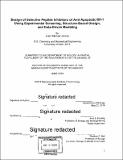Design of selective peptide inhibitors of anti-apoptotic Bfl-1 using experimental screening, structure-based design, and data-driven modeling
Author(s)
Jenson, Justin Michael
DownloadFull printable version (22.76Mb)
Other Contributors
Massachusetts Institute of Technology. Department of Biology.
Advisor
Amy E. Keating.
Terms of use
Metadata
Show full item recordAbstract
Protein-protein interactions are central to all biological processes. Designer reagents that selectively bind to proteins and inhibit their interactions can be used to probe protein interaction networks, discover druggable targets, and generate potential therapeutic leads. Current technology makes it possible to engineer proteins and peptides with desirable interaction profiles using carefully selected sets of experiments that are customized for each design objective. There is great interest in improving the protein design pipeline to create protein binders more efficiently and against a wider array of targets. In this thesis, I describe the design and development of selective peptide inhibitors of anti-apoptotic BcI-2 family proteins, with an emphasis on targeting Bfl-1. Anti-apoptotic Bcl-2 family proteins bind to short, pro-apoptotic BH3 motifs to support cellular survival. Overexpression of BfI-1 has been shown to promote cancer cell survival and the development of chemoresistance. Prior work suggests that selective inhibition of Bfl-1 can induce cell death in Bfl-1 overexpressing cancer cells without compromising healthy cells that also rely on anti-apoptotic BcI-2 proteins for survival. Thus, Bfl-1-selective BH3 mimetic peptides are potentially valuable for diagnosing Bfl-1 dependence and can serve as leads for therapeutic development. In this thesis, I describe three distinct approaches to designing potent and selective Bfl-1 inhibitors. First, I describe the design and screening of libraries of variants of BH3 peptides. I show that peptides from this screen bind in a previously unobserved BH3 binding mode and have large margins of specificity for Bfl-1 when tested in vitro and in cultured cells. Second, I describe a computational model of the specificity landscape of three anti-apoptotic Bcl-2 proteins including Bfl-1. This model was derived from high-throughput affinity measurement of thousands of peptides from BH3 libraries. I show that this model is useful for designing peptides with desirable interaction profiles within a family of related proteins. Third, I describe the use of a scoring potential built on the amino acid frequencies from well-defined structural motifs complied from the Protein Data Bank to design novel BH3 peptides targeting Bfl-1.
Description
Thesis: Ph. D., Massachusetts Institute of Technology, Department of Biology, 2018. Cataloged from PDF version of thesis. Includes bibliographical references.
Date issued
2018Department
Massachusetts Institute of Technology. Department of BiologyPublisher
Massachusetts Institute of Technology
Keywords
Biology.